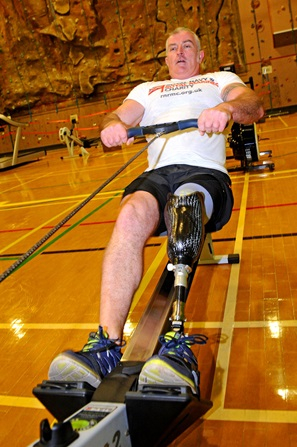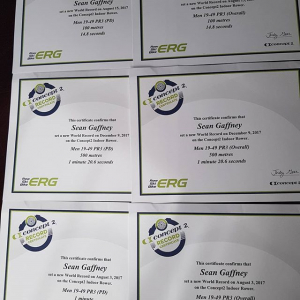New Adaptive Record Categories
Adaptive athletes have been racing at indoor rowing events for over 20 years. There are lots of modifications possible with the indoor rower to make it inclusive, whether a tractor seat, adapted handle for athletes with a single arm, or the Voice Guidance mode in ErgData iOS which reads out performance data for visually impaired athletes.
Previously, all adaptive rowing races both on and off the water, were held over 1000m, and this was the only event for which we held indoor records. At World Rowing's Extraordinary Congress in 2017, the full integration of adaptive rowing was approved, and the on-water race distance was made 2000m for all World Rowing events, including the Paralympic Games. This means that all adaptive rowing events will now match the Olympic rowing events. As a result, many of the major indoor rowing races, such as this year's World Rowing Indoor Championships (hosted by the Erg Sprints in Alexandria, Virginia) as well as national indoor championships in places like Great Britain, France and the Netherlands, have also moved to 2000m.
Rather than just add 2000m records to our existing 1000m records, we've taken the opportunity to greatly expand the number of records we hold. It's now possible to set an adaptive record in any ranking event category, from 100m all the way up to a full 42,195m marathon. In addition to PR1 (Arms and Shoulders), PR2 (Trunk and Arms) and PR3 (Leg, Trunk and Arms) categories, we also have a number of PR3 subcategories, plus FES (Functional Electrical Stimulation) and FES Assisted Return. For both men and women, there are now three age categories: 18 and under, 19 to 49, and 50 plus.
In total, there are now 780 adaptive records up for grabs! While 1000m and 2000m records still need to be set at races, all the new ranking records can be set anywhere. The only difference for adaptive records is that athletes must have either a proof of sport category certification from an international or national governing body, or provide a completed physician's sport category form. This is available to download from Individual Record Requirements, which also has more information about how to claim a new record.


One of the earliest people to benefit from the expanded record categories was Sean Gaffney from the UK. The former Royal Naval Petty Officer, who lost a leg in a freak accident at work, has become a notable name on the adaptive rowing scene: He won double gold at the Invictus Games in 2016, and took silver at the inaugural World Rowing Indoor Championships. Sean now holds four world records for PR3—Physical Disability: one minute, 100m, 500m and 2000m. According to Sean, "The expansion and greater inclusion of adaptive records shows Concept2's dedication to making indoor rowing a truly inclusive sport for people of all abilities."
We're excited to see what the future brings for adaptive rowing. The last few years have seen a lot of growth in the sport; new events, such as the Invictus Games and the World Rowing Indoor Championships, have been matched by an increase in participation. Adaptive entries in the Online Ranking are up by 15% over the past few years, and adaptive entries in the World Rowing Indoor Sprints have doubled since the start. Of those 780 adaptive records, 187 have been claimed so far, and we're looking forward to the day when we have the full slate of them.
